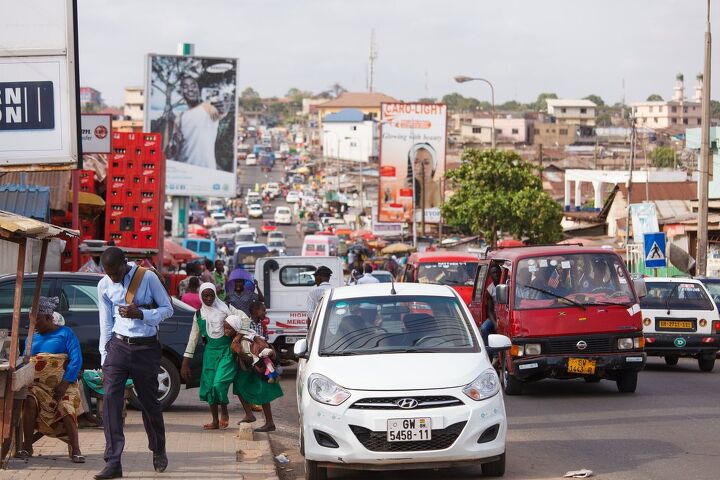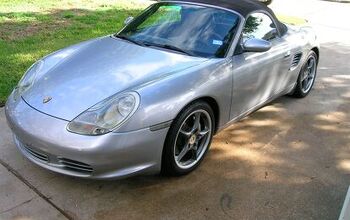Ghana Have Factories: African Nation Bans Importation of Old Cars

Ghana has banned the importation of cars older than 10 years in a move designed to attract automotive plants. As a major importer of second-hand vehicles, the West African nation is largely dependent upon cars discarded by other nations. However, the country’s leadership wants it to become an automotive hub for at least a healthy chunk of the continent. This is a relatively new yet persistent dream for the nation, and it includes a bizarre roster of characters we don’t quite know what to make of.
Ending the importation of older models (sort of a reverse Imported Vehicle Safety Compliance Act) isn’t the only big change taking place in Ghana, however. According to Bloomberg, there are sweet deals being laid out for manufacturers to peruse:
The new law also provides import-duty rebates for companies that manufacture or assemble cars in Ghana, according to the act of parliament obtained Thursday by Bloomberg. The embargo will take effect six months after the manufacturing or assembling of new vehicles in Ghana begin under a special government program meant to draw investment.
Volkswagen, Nissan, Toyota Motor Corp., Suzuki Motor Corp. and Renault SA are among automakers weighing the local assembly of vehicles in a country where used cars make up about 70 [percent] of vehicle imports. Ghana is seeking to become a car-manufacturing hub for West Africa, a region with more than 380 million people.
The average per capita income in Ghana is a mere $2,200, making automobile ownership a luxury for many. In fact, the country has a fairly robust dealer network that specializes in fixing up old, imported vehicles, and that body has been hesitant to endorse the new rules. Many of the most affordable Ghanaian cars are vehicles that have been involved in accidents that dealers can repair and flip as cheaply as possible. The government has suggested that this is unsafe and included provisions to make the importation of any automobile that has been involved in an accident illegal — regardless of when it was built.
That’s bound to obliterate a large quadrant of the automotive market, potentially creating new troubles for low-income families in need of a car, as well as repair shops. Still, the country’s leadership claims the need for safer vehicles outweighs the financial risks and says this ultimately serves the nation by creating better-paying industrial jobs.
President Nana Akufo-Addo signed the new provisions into law on April 30th; they take effect this October. Assuming automakers play Ghana’s game, this might all turn out to be for the betterment of the nation. If not, we expect unconsidered consequences to surface pretty swiftly. Parliamentary documents pertaining to the rule already estimate the changes costing the country $143 million in customs revenue within the first three years, with fears expressed about the budget-oriented secondhand auto market.
[Image: Sura Nualpradid/Shutterstock]

A staunch consumer advocate tracking industry trends and regulation. Before joining TTAC, Matt spent a decade working for marketing and research firms based in NYC. Clients included several of the world’s largest automakers, global tire brands, and aftermarket part suppliers. Dissatisfied with the corporate world and resentful of having to wear suits everyday, he pivoted to writing about cars. Since then, that man has become an ardent supporter of the right-to-repair movement, been interviewed on the auto industry by national radio broadcasts, driven more rental cars than anyone ever should, participated in amateur rallying events, and received the requisite minimum training as sanctioned by the SCCA. Handy with a wrench, Matt grew up surrounded by Detroit auto workers and managed to get a pizza delivery job before he was legally eligible. He later found himself driving box trucks through Manhattan, guaranteeing future sympathy for actual truckers. He continues to conduct research pertaining to the automotive sector as an independent contractor and has since moved back to his native Michigan, closer to where the cars are born. A contrarian, Matt claims to prefer understeer — stating that front and all-wheel drive vehicles cater best to his driving style.
More by Matt Posky
Latest Car Reviews
Read moreLatest Product Reviews
Read moreRecent Comments
- VoGhost If you want this to succeed, enlarge the battery and make the vehicle in Spartanburg so you buyers get the $7,500 discount.
- Jeff Look at the the 65 and 66 Pontiacs some of the most beautiful and well made Pontiacs. 66 Olds Toronado and 67 Cadillac Eldorado were beautiful as well. Mercury had some really nice looking cars during the 60s as well. The 69 thru 72 Grand Prix were nice along with the first generation of Monte Carlo 70 thru 72. Midsize GM cars were nice as well.The 69s were still good but the cheapening started in 68. Even the 70s GMs were good but fit and finish took a dive especially the interiors with more plastics and more shared interiors.
- Proud2BUnion I typically recommend that no matter what make or model you purchase used, just assure that is HAS a prior salvage/rebuilt title. Best "Bang for your buck"!
- Redapple2 jeffbut they dont want to ... their pick up is 4th behind ford/ram, Toyota. GM has the Best engineers in the world. More truck profit than the other 3. Silverado + Sierra+ Tahoe + Yukon sales = 2x ford total @ $15,000 profit per. Tons o $ to invest in the BEST truck. No. They make crap. Garbage. Evil gm Vampire
- Rishabh Ive actually seen the one unit you mentioned, driving around in gurugram once. And thats why i got curious to know more about how many they sold. Seems like i saw the only one!


































Comments
Join the conversation
Remember the saying "the best is the enemy of the good". Trying to climb out of third world poverty, obtaining any kind of motor vehicle can be a life changing, perhaps life-saving experience.
If I'm not mistaken Ghana gets a lot of used JDM stuff theses days, much like Russia did in the 90s-mid 00s before likewise clamping down. At one point it was something like 75% of the male population of the Russian Far East was involved in the used Japanese car business, whether importing, reselling, repairing, parts, and major crime syndicates soon latched on as well. The business extended well into Western Siberia: guys would get a train or plane ticket and a bag of US dollars, go to Vladivostok, pick up a used car from a middle-man at the massive outdoor car market, and start the treacherous journey home on (then) dirt roads. They'd buy a full set of 4 extra wheels/tires on their way out of town and stock up on food/fuel. Minimize stops, only sleep near police outposts and well lit and populated gas stations, travel in a caravan. Road bandits would prey on these guys big time. It was a wild and crazy gold rush. Same thing happened in Western Russia running cars from Germany and the Baltics.